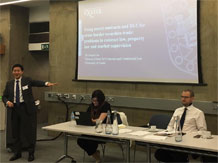articles

Dr Joseph Lee
Smart contracts and LegalTech- the future?
Dr Joseph Lee, Director of the Centre for Commercial and Corporate Law, hosted an international conference on international commercial contract law in London. The conference focused on the use of new smart technologies and new trade practices in international transactions.
Technology is changing market participants’ behaviour at a fast pace, yet the law lags behind: either there are no regimes to ensure the safety and integrity of the market; or the application of existing principles has not been adapted and developed so as to provide legal certainty whereby parties can make informed commercial decisions. Is there a new concept of law emerging for the international sale of goods, financial instruments, digital contents, and data; that is a new customary international commercial law capable of sustaining a shared market (economy), incorporating regulation aimed at dealing with market failure and addressing democracy deficiency in the law-marking process?
The conference examined a number of issues in contract law, property law, and regulatory law. We can continue relying on the classical idea of pacta sunt servanda (‘freedom of contract’, its neoclassical version) to hold up the effect of smart contracts that are self-executing and auto-enforcing. Yet, are we able to rely on algorithms to interpret ambiguous terms that trigger execution and auto-enforcement? How could an arbitration clause be written in smart contracts so that any arbitral award would still be enforceable under the New York Convention?
In the field of property law, some new technology-based commercial techniques are already being used for cross-border transactions such as sea waybills tracking ownership and pin code for delivery. However, how they could effectively and safely facilitate the transfer of property interests remains problematic. Other issues such as market supervision, settlement finality, and data protection also raise the important question of how LegalTech and RegTech can address economic and social externalities.
Date: 19 October 2018
